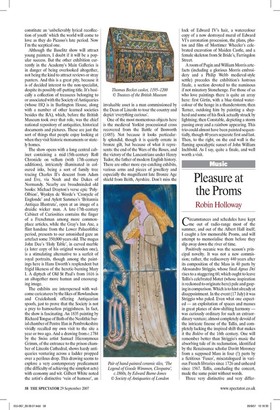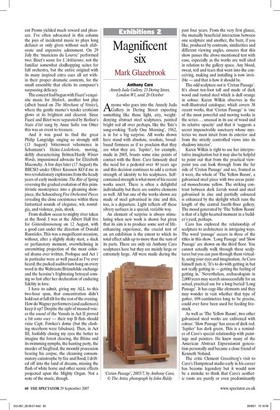Pleasure at the Proms
Robin Holloway Circumstances and schedules have kept me out of radio-range most of the summer, and out of the Albert Hall itself; I caught a few memorable Proms, and will attempt to memorialise them before they slip away down the river of time.
Positively oceanic was the season's principal novelty. It was not a new commission; rather, the rediscovery 440 years after its composition of the Mass in 40 parts by Alessandro Striggio, whose final Agnus Dei rises to a staggering 60, which ought to leave Tallis's celebrated Motet (whose inspiration is reckoned to originate here) pale and gasping in comparison. Which is to hint already at disappointment. In the event (17 July) it was Striggio who paled. Even what one expected — an exploitation of spaces and masses in great planes of slow-shifting harmony — was curiously ordinary for such an extraordinary venture; almost completely devoid of the intricate finesse of the Tallis, and completely lacking the inspired shift that makes it the Bolero of the 16th century. One will remember better than Striggio's music the absorbing tale of its reclamation, identified by the Renaissance scholar Davitt Moroney from a supposed Mass in four (!) parts by a fictitious 'Fusco', miscatalogued in various French libraries since 1726 and unheard since 1567. Tallis, concluding the concert, made the same point without words.
Three very distinctive and very different Proms yielded much reward and pleasure. I've often advocated in this column the joys of incidental music to plays long defunct or only given without such elaborate and expensive adornment. On 29 July the `musiciens du Louvre' performed two: Bizet's score for L'Arlesienne, not the familiar somewhat clodhopping suites for full orchestra, but the entire original with its many inspired extra cues all set within their proper dramatic contexts, for the small ensemble that elicits its composer's surpassing delicacy.
The concert had begun with Faures exquisite music for Shylock, another lost play (albeit based on The Merchant of Venice), where the gentle master's tender eroticism glows at its brightest and clearest. Since Faure and Bizet were separated by Berlioz's Nuits d'ete sung by Anne Sofie von Otter this was an event to treasure.
And it was good to find the great Philip Langridge singing so strongly still (13 August): bittersweet vehemence in Schumann's Heine-Liederkreis, moving, deftly characterising Britten/Hardy Winter Words, impassioned advocate for Elizabeth Maconchy. A few days later (17 August) the BBCSO under Oliver Knussen KO'd me in two revolutionary explosions from the heady years of early modernism: The Rite of Spring reversing the gradual evolution of this primitivistic masterpiece into a gleaming showpiece, the Schoenberg Five Orchestral Pieces revealing the close coexistence within these fantastical sounds of elegance, wit, nostalgia, and violence, pain, shock.
From shallow ocean to mighty river taken at the flood. I was at the Albert Hall live for Gotterclammentng on 12 August, with a good cast under the direction of Donald Runnicles. This was a magnificent occasion; without, after a slightly shaky start, a slack or perfunctory moment, overwhelming in unremitting projection of the most colossal drama ever written. Prologue and Act 1 in particular were as well paced as I've ever heard; the packed auditorium hung on every word in the Waltraute/Brannhilde exchange and the heroine's frightening betrayal coming so fast after her declaration of enduring fidelity in love.
I have to admit, giving my ALL to this two-hour span, that concentration didn't hold out at full tilt for the rest of the evening. How do Wagner performers (and audiences) keep it up? Despite the sight of massed voices the sound of the Vassals in Act II proved a bit sotto voce — their top B-flats should raise Capt. Fowkes's dome (but the clashing steerhorn were fabulous). Then, in Act III, foolishly closing my eyes the better to imagine the forest clearing, the Rhine and its swimming nymphs, the hunting party, the murder of Siegfried, the moonlit procession bearing his corpse, the cleansing consummatory catastrophe by fire and flood, I drifted off into the land of dreams, missing the flash of white horse and other scenic effects projected upon the Mighty Organ. Not a note of the music, though.
























































 Previous page
Previous page